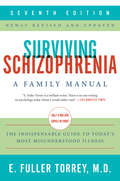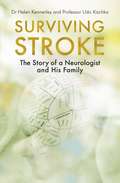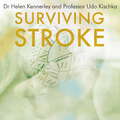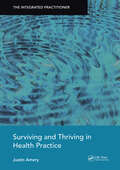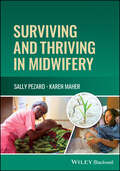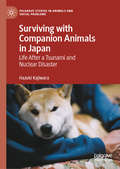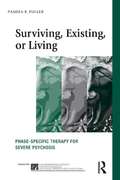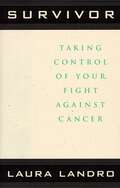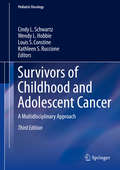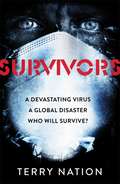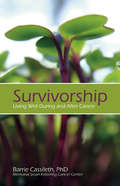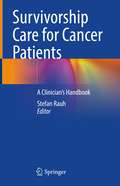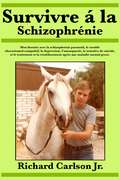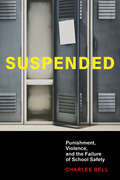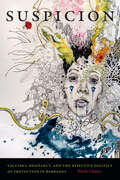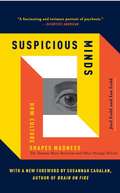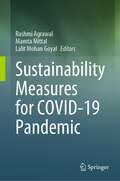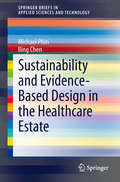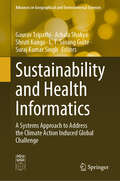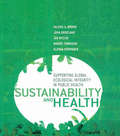- Table View
- List View
Surviving Schizophrenia, 7th Edition: A Family Manual
by E. Fuller TorreyUpdated throughout and filled with all the latest research, treatment plans, commonly asked questions and more, the bestselling resource on schizophrenia is back—now in its seventh edition.“E. Fuller Torrey is a brilliant writer. There is no one writing on psychology today whom I would rather read.”— Los Angeles TimesSince its first publication in 1983, Surviving Schizophrenia has become the standard reference book on the disease and has helped thousands of patients, their families, and mental health professionals. In clear language, this much-praised and important book describes the nature, causes, symptoms, treatment, and course of schizophrenia and also explores living with it from both the patient's and the family's point of view. This new, completely updated seventh edition includes the latest research findings on what causes the illness, as well as information about the newest drugs for treatment, and answers the questions most often asked by families, consumers, and providers.An indispensable guide for those afflicted by schizophrenia as well those who care for them, Surviving Schizophrenia covers every aspect of the condition and sheds new light on an often-misunderstood illness.
Surviving Stroke: The Story of a Neurologist and His Family
by Helen Kennerley Udo KischkaIn October 2016, Udo Kischka suffered a severe stroke. A large intra-cerebral bleed, a bleed deep in the right side of his brain. He was not a typical stroke patient: Professor Kischka was a neurologist and specialist in stroke rehabilitation. Like all stroke patients, he embarked on a journey of recovery. In his case, it was a re-education in his field of expertise. When he uttered the words, 'This is a life changing event' to his wife a few hours after the stroke, he had no idea just how life changing it would be or that there would be still be a good life to be had. Written by experts on both sides of the fence - a stroke victim who is a stroke specialist, and a psychologist who helps others and now has to help herself and her family - this is a personal and brutally honest story of a family's survival. This accessible and relatable book provides insight and realistic hope about what might lie ahead following a stroke, as well as offering both practical and emotional support.
Surviving Stroke: The Story of a Neurologist and His Family
by Helen Kennerley Udo KischkaIn October 2016, Udo Kischka suffered a severe stroke. A large intra-cerebral bleed, a bleed deep in the right side of his brain. He was not a typical stroke patient: Professor Kischka was a neurologist and specialist in stroke rehabilitation. Like all stroke patients, he embarked on a journey of recovery. In his case, it was a re-education in his field of expertise. When he uttered the words, 'This is a life changing event' to his wife a few hours after the stroke, he had no idea just how life changing it would be or that there would be still be a good life to be had. Written by experts on both sides of the fence - a stroke victim who is a stroke specialist, and a psychologist who helps others and now has to help herself and her family - this is a personal and brutally honest story of a family's survival. This accessible and relatable book provides insight and realistic hope about what might lie ahead following a stroke, as well as offering both practical and emotional support.
Surviving Stroke: The Story of a Neurologist and His Family
by Helen Kennerley Udo KischkaIn October 2016, Udo Kischka suffered a severe stroke. A large intra-cerebral bleed, a bleed deep in the right side of his brain. He was not a typical stroke patient: Professor Kischka was a neurologist and specialist in stroke rehabilitation. Like all stroke patients, he embarked on a journey of recovery. In his case, it was a re-education in his field of expertise. When he uttered the words, 'This is a life changing event' to his wife a few hours after the stroke, he had no idea just how life changing it would be or that there would be still be a good life to be had. Written by experts on both sides of the fence - a stroke victim who is a stroke specialist, and a psychologist who helps others and now has to help herself and her family - this is a personal and brutally honest story of a family's survival. This accessible and relatable book provides insight and realistic hope about what might lie ahead following a stroke, as well as offering both practical and emotional support.
Surviving and Thriving in Health Practice: The Integrated Practitioner
by Justin AmeryThis extraordinary new series fills a void in practitioner development and well-being. The books take a reflective step back from the tick-box, target-driven and increasingly regulated world of 21st century health practice; and invite us to revisit what health and health practice actually are. Building carefully on the science and philosophy of health, each book addresses the messy, complex and often chaotic world of real-life health practice and offers an ancient but now almost revolutionary understanding for students and experienced practitioners alike: that health practice is a fundamentally creative and compassionate activity. The series as a whole helps practitioners to redefine and recreate their daily practice in ways that are healthier for both patients and practitioners. The books provide a welcome antidote to demoralisation and burn-out amongst practitioners, reversing cynicism and reviving our feeling of pride in, and our understanding of, health practice. By observing practice life through different lenses, they encourage the development of efficiency, effectiveness and, above all, satisfaction. The first book in this series, The Integrated Practitioner: Surviving and Thriving in Health Practice, encourages practitioners to consider the importance of their personal position as the foundation of health practice. It inspires practitioners to consider themselves as their own most important tool', encouraging them to take better care of themselves, and provides numerous opportunities for reflection through case studies and activities.
Surviving and Thriving in Midwifery
by Sally Pezaro Karen MaherA practical, evidence-based approach to psychological and professional well-being for midwives Midwifery is an essential profession with a life-saving role in perinatal care. However, studies show that midwives experience remarkably high levels of work-related psychological distress, leading to equally high levels of attrition from the profession. If these issues are not addressed, the loss of qualified midwives may seriously impact the profession’s ability to fight perinatal and infant mortality worldwide. Surviving and Thriving in Midwifery offers a practical, evidence-based guide for midwives to achieve social, psychological, and professional success. Drawing upon extensive research as well as the personal experiences of midwives, the book invites readers to respond to a range of workplace challenges and develop robust strategies for coping, conflict resolution, and more. Thoroughly grounded in occupational psychology, it is a vital tool for any midwife looking to thrive in this critical profession. Surviving and Thriving in Midwifery readers will also find: A global perspective on midwifery across the life courseThe author’s personal journey through their own experience of losing their fitness to practice through ill health, before regaining it and achieving lasting successDetailed strategies for building psychological safety in midwifery teams, setting boundaries, and many more Surviving and Thriving in Midwifery is ideal for aspiring, student, and qualified midwives worldwide.
Surviving with Companion Animals in Japan: Life after a Tsunami and Nuclear Disaster (Palgrave Studies in Animals and Social Problems)
by Hazuki KajiwaraThis book examines how relationships between guardians and companion animals were challenged during a large-scale disaster: the tsunami of March 2011 and the following nuclear disaster in Fukushima. The author interrogates: 1) How did guardians and their companion animals survive the large disaster?; 2) Why was the relationship between guardians and their companion animals ignored during and after a disaster?; and 3) What structures and/or mechanisms shaped the outcomes for animals and their guardians? Through a critical realist framework, combined with a theoretical perspective developed by Roy Bhaskar and his colleagues, the author argues that despite the trivialization of companion animals by government officials, relationships between animals and guardians were often able to be maintained, in some cases through great pains by the guardians. While the notion of human-animal relationships in Japan has thus far been dominated by economic logic, the author reveals dynamics between guardians and companion animal transcend such structures, forging the concept of “bonding rights.”
Surviving, Existing, or Living: Phase-specific therapy for severe psychosis (The International Society for Psychological and Social Approaches to Psychosis Book Series)
by Pamela R. FullerFor professionals working with people who experience severe psychosis, increasing empirical evidence for the benefits of psychotherapy for psychosis has been especially welcome. Given the limitations of medication-only approaches and the need for an expanded perspective, including for those diagnosed with schizophrenia, Surviving, Existing, or Living takes a fresh look at severe psychosis, offering a heuristic model for understanding psychosis along a continuum of severity, from the extreme experience of acutely impairing psychosis to a more enriched life experience. Pamela Fuller emphasizes that facilitating recovery from psychosis requires appropriately and effectively matching the type and timing of interventions to client readiness and capabilities. The need to consider each individual according to which of three primary issues/phases preoccupy the person with psychosis is essential for tailoring treatment. She identifies these phases as: Surviving Phase – preoccupation with survival Existing Phase – preoccupation with restriction of life experiences in order to cope Living Phase – preoccupation with quality of life and relationships Surviving, Existing, or Living examines the rationale for these three phases, and provides details of phase-specific treatment interventions as well as a 'how to' guide for facilitating engagement and for determining 'what to do when,' including with those experiencing acute, severe psychosis. Rich clinical case examples are provided to highlight concepts and the types of interventions. Trauma-specific and group interventions for psychosis are also described, as well as ways to foster resilience in the professional who works with individuals with psychosis. Surviving, Existing, or Living offers a detailed guide to help individuals experiencing psychosis move from suffering to recovery, beyond surviving or existing toward more fully living. The book will be essential reading for professionals in the fields of psychology, psychiatry, counseling, medicine, social work, nursing, occupational, recreational, and vocational therapies, experience-based experts, and students.
Survivor: Taking Control of Your Fight Against Cancer
by Laura LandroShortly after her thirty-seventh birthday, Wall Street Journal reporter and editor Laura Landro was told that she had chronic myelogenous leukemia. Survivor is the remarkable account of her battle against this devastating, potentially fatal cancer -- and her successful struggle to take control of her own case. At first almost paralyzed with fear when diagnosed with this form of blood cancer, Laura Landro resolved to use her journalistic training to seek out the treatment that would give her the best shot at surviving. Noting that most Americans spend more time researching what kind of car to buy than they do their health care, she shows how and why all patients can -- and must -- arm themselves with the facts, learn to understand medical jargon, get doctors to answer all their questions in layman's terms, weigh conflicting medical opinions, and make the difficult choice among the options open to them. Survivor is a moving, deeply personal account of a life-and-death experience. In it, Laura Landro tells of a fight to live that brought her to the brink of death -- and to a despair that at times made her wonder if the struggle was worth it. Her inspiring story offers all readers hope and the know-how to navigate the terrifying and bewildering world of medicine, even when they are very ill and at their most vulnerable. Laura Landro has written a book that is must reading for everyone who has been diagnosed with cancer, and for everyone who has a cancer patient in the family. It will rank beside such classics as Norman Cousins's Anatomy Of an Illnes As Perceived by the Patient, Cornelius Ryan's A Private Battle, and John Gunther's Death Be Not Proud, at once a work of literature and a manifesto for every cancer patient.
Survivors of Childhood and Adolescent Cancer
by Cindy L. Schwartz Wendy L. Hobbie Louis S. Constine Kathleen S. RuccioneThis book is a comprehensive guide that will help medical professionals - pediatric oncologists, nurses, pediatricians, family practitioners, internists, radiation oncologists, surgeons - to understand and manage the long-term effects of treatment for childhood and adolescent cancer. The consequences of treatment are described for each organ system, with explanation of pathophysiology, clinical manifestations, detection and screening and management. Disease- and organ-based algorithms of care and tables designed to facilitate the assessment of late effects are highlights of the book and will assist in the provision of hands-on care that is up to date and geared to clinical need. Among the other topics addressed are stem cell transplantation, psychological care, legal issues, transition to adulthood and methodological issues in the study of survivorship care.
Survivors: The gripping, bestselling novel of life after a global pandemic
by Terry NationSurvivors of a global plague battle for life on an empty planet. A gripping vision of a post-apocalyptic world...'A fine piece of British post-apocalyptic fiction' 'Nation's novel is based on his original cult series...and is all the better for it, being far, far more gritty and realistic' SUNDAY SUNA virus has wiped out 95 per cent of the world's population in just a few weeks, leaving the remaining 5 per cent to stay alive in a world devoid of the most basic amenities - electricity, transport and medicine. The few survivors of the human race are forced to fall back on the most primitive skills in order to live and re-establish some semblance of law and order.Abby Grant, widowed by the plague, moves through this new dark age with determination, sustained by hope that her son, who fled his boarding school at the onset, has survived. She knows she must relearn the skills on which civilisation was built. With others, she founds a commune and the group return to the soil. But marauding bands threaten their existence. For Abby, there's a chance for a new life and love when she encounters James Garland, the fourteenth Earl of Woodhouse, who is engaged in a desperate fight to save his ancestral home. But more important, she must find her son.
Survivors: The gripping, bestselling novel of life after a global pandemic
by Terry NationSurvivors of a global plague battle for life on an empty planet. A gripping vision of a post-apocalyptic world...'A fine piece of British post-apocalyptic fiction' 'Nation's novel is based on his original cult series...and is all the better for it, being far, far more gritty and realistic' SUNDAY SUNA virus has wiped out 95 per cent of the world's population in just a few weeks, leaving the remaining 5 per cent to stay alive in a world devoid of the most basic amenities - electricity, transport and medicine. The few survivors of the human race are forced to fall back on the most primitive skills in order to live and re-establish some semblance of law and order.Abby Grant, widowed by the plague, moves through this new dark age with determination, sustained by hope that her son, who fled his boarding school at the onset, has survived. She knows she must relearn the skills on which civilisation was built. With others, she founds a commune and the group return to the soil. But marauding bands threaten their existence. For Abby, there's a chance for a new life and love when she encounters James Garland, the fourteenth Earl of Woodhouse, who is engaged in a desperate fight to save his ancestral home. But more important, she must find her son.
Survivorship
by Barrie CassilethCancer patients face a daunting world of confusing information about treatment options. They may have heard of using integrative medicine to complement traditional care and alleviate both short- and long-term side effects of cancer treatments, but where do they locate accurate information on acupuncture, massage, yoga, and nutritional therapies? Survivorship: Living Well During and After Cancer provides up-to-date evidence-based information on available therapies from Dr. Barrie Cassileth, a leader in integrative cancer treatment and founder of the Integrative Medicine Service at Memorial Sloan-Kettering Cancer Center. Dr. Cassileth will help patients begin to separate the facts from the hype when considering complementary medicine. A full listing of "anti-quackery" online resources is included.
Survivorship
by Barrie CassilethCancer patients face a daunting world of confusing information about treatment options. They may have heard of using integrative medicine to complement traditional care and alleviate both short- and long-term side effects of cancer treatments, but where do they locate accurate information on acupuncture, massage, yoga, and nutritional therapies? Survivorship: Living Well During and After Cancer provides up-to-date evidence-based information on available therapies from Dr. Barrie Cassileth, a leader in integrative cancer treatment and founder of the Integrative Medicine Service at Memorial Sloan-Kettering Cancer Center. Dr. Cassileth will help patients begin to separate the facts from the hype when considering complementary medicine. A full listing of "anti-quackery" online resources is included.
Survivorship
by Barrie CassilethCancer patients face a daunting world of confusing information about treatment options. They may have heard of using integrative medicine to complement traditional care and alleviate both short- and long-term side effects of cancer treatments, but where do they locate accurate information on acupuncture, massage, yoga, and nutritional therapies? Survivorship: Living Well During and After Cancer provides up-to-date evidence-based information on available therapies from Dr. Barrie Cassileth, a leader in integrative cancer treatment and founder of the Integrative Medicine Service at Memorial Sloan-Kettering Cancer Center. Dr. Cassileth will help patients begin to separate the facts from the hype when considering complementary medicine. A full listing of "anti-quackery" online resources is included.
Survivorship Care for Cancer Patients: A Clinician’s Handbook
by Stefan RauhThis book is a valuable source for oncologists and all other physicians dealing with cancer survivors. It provides detailed information on the evidence-based benefits and forms of intervention, with contributions by a highly prestigious and well recognized panel of experts. Chapters deal with all features of survivorship outlining the role of the oncologist and other caregivers and discusses survivorship care in different countries and different settings. The book addresses new challenges and complex issues broader than medical issues faced by patients who are cured highlighting that cancer is no longer a death sentence. It provides evidence-based management guidance and addresses issues such as symptom management, palliative care, screening for recurrence, rehabilitation, fertility issues among others. This is an indispensable resource for oncologists, oncology nurses and other professionals dealing with cancer patients as well as patient advocacy groups and cancer leagues.
Survivre à la schizophrénie
by Richard Carlson Jr. Berenice Arrieta CortésRichard Carlson Jr. a été diagnostiqué avec la schizophrénie paranoïde quand il avait vingt et un ans. Sa maladie s'est manifestée pour la première fois lorsqu'il était adolescent. La psychiatrie moderne a grandement échoué Richard pendant plus d'une décennie. Puis, après un incident impliquant la police, il a vraiment compris que son diagnostic était réel, et a finalement commencé le long processus de récupération. Plus de dix ans plus tard, sa vie est grandement améliorée. Au cours de son traitement, Richard a également guéri de la dépression, du trouble obsessionnel-compulsif et de la léthargie. Ne laissez pas ce qui est arrivé à Richard vous arriver, à un être cher ou à un patient souffrant de maladie mentale grave. Soyez toujours honnêtes les uns avec les autres et avec votre psychiatre.
Suspended: Punishment, Violence, and the Failure of School Safety
by Charles BellThe disturbing truth: school suspension does more than impede Black students' academic achievement—it also impacts their parents' employment and can violate state and federal laws.Decades of urban disinvestment and poverty have made educational attainment for Black youth more vital than at any time in recent history. Yet in their pursuit of quality education, many Black families are burdened by challenging barriers to success, most notably the frequency and severity of school punishment. Such punishment is meant to be a disciplinary tool that makes schools safer, but it actually does the opposite—and is particularly harmful for Black students and their families.Focusing on schools in inner-city and suburban Detroit, Charles Bell draws on 160 in-depth interviews with Black high school students, their parents, and their teachers to illuminate the negative outcomes that are associated with out-of-school suspension. Bell also sheds light on the inherent shortcomings of school safety measures as he describes how schools fail to protect Black students, which leaves them vulnerable to bullying and victimization. The students he interviews offer detailed insight into how the lack of protection they received in school intensified their fear of being harmed and even motivated them to use violence to establish a reputation that discouraged attacks. Collectively, their narratives reveal how receiving a suspension for fighting in school earned them respect, popularity, and a reputation for toughness—transforming school punishment into a powerful status symbol that destabilizes classrooms.A thought-provoking and urgent work, Suspended calls for an inclusive national dialogue on school punishment and safety reform. It will leave readers engrossed in the students' and parents' tearful narratives as they share how school suspension harmed students' grades, disrupted parents' employment, violated state and federal laws, and motivated families to withdraw from punitive districts.
Suspicion: Vaccines, Hesitancy, and the Affective Politics of Protection in Barbados
by Nicole CharlesIn 2014 Barbados introduced a vaccine to prevent certain strains of the human papillomavirus (HPV) and reduce the risk of cervical cancer in young women. Despite the disproportionate burden of cervical cancer in the Caribbean, many Afro-Barbadians chose not to immunize their daughters. In Suspicion, Nicole Charles reframes Afro-Barbadian vaccine refusal from a question of hesitancy to one of suspicion. Drawing on ethnographic fieldwork, black feminist theory, transnational feminist studies and science and technology studies, Charles foregrounds Afro-Barbadians' gut feelings and emotions and the lingering trauma of colonial and biopolitical violence. She shows that suspicion, far from being irrational, is a fraught and generative affective orientation grounded in concrete histories of mistrust of government and coercive medical practices foisted on colonized peoples. By contextualizing suspicion within these longer cultural and political histories, Charles troubles traditional narratives of vaccine hesitancy while offering new entry points into discussions on racialized biopolitics, neocolonialism, care, affect, and biomedicine across the Black diaspora.Duke University Press Scholars of Color First Book Award recipient
Suspicious Minds
by Joel Gold Ian GoldWhat if you woke up with the alarming suspicion that you were being watched?One day in 2003, a patient unlike any other that Dr. Joel Gold had seen before was admitted to his unit at Bellevue Hospital. This man claimed he was being filmed constantly and that his life was being broadcast around the world like The Truman Show--the 1998 film depicting a man who is unknowingly living out his life as the star of a popular soap opera. Over the next few years, Dr. Gold saw a number of patients suffering from what he and his brother, Dr. Ian Gold, began calling the "Truman Show delusion," launching them on a quest to understand the nature of this particular phenomenon, of delusions more generally, and of madness itself. The current view of delusions is that they are the result of biology gone awry, of neurons in the brain misfiring. In contrast, the Golds argue that delusions are the result of the interaction between the brain and the social world. By exploring the major categories of delusion through fascinating case studies and marshaling the latest research in schizophrenia, the brothers reveal the role of culture and the social world in the development of psychosis--delusions in particular. Suspicious Minds presents a groundbreaking new vision of just how dramatically our surroundings can influence our brains.
Suspicious Minds: How Culture Shapes Madness
by Joel Gold Ian GoldCombining extraordinary true stories with the latest research, Joel and Ian Gold take us on a wild journey through the delusional brain to explore the intersection of neuroscience, biology, and culture.<P> Mr. A. was admitted to Dr. Joel Gold’s inpatient unit at Bellevue Hospital in 2002. He was, he said, being filmed constantly, and his life was being broadcast around the world “like The Truman Show”—the 1998 film depicting a man who is unknowingly living out his life as the star of a popular soap opera. Over the next few years, Gold saw a number of patients suffering from what he and his brother, Dr. Ian Gold, began calling the “Truman Show Delusion,” launching them on a quest to understand the nature of this particular phenomenon, of delusions more generally, and the nature of madness itself.<P> The current view of delusions is that they are the result of biology gone awry, of neurons in the brain misfiring. In contrast, the Golds argue, delusions are in fact the result of the interaction between the brain and the social world. By exploring the major categories of delusion via fascinating case studies and marshaling the latest research in schizophrenia, the brothers reveal the role of culture and the social world in the development of psychosis, notably delusions. The result is a groundbreaking new direction for thinking about the interaction of the brain and the world around us.<P> Sure to appeal to those who admire the work of Oliver Sacks, Steven Pinker, and Antonio Damasio, Suspicious Minds presents a fascinating study about just how dramatically our surroundings can influence our brains.<P>
Sustainability Measures for COVID-19 Pandemic
by Mamta Mittal Lalit Mohan Goyal Rashmi AgrawalThis book focuses on sustainability issues post COVID-19 outbreak, discusses ways to restrict global spread of the pandemic, and also how to survive holistically in the environment. It also discusses the economic impacts on the world due to the coronavirus outbreak. There is a strong need for monitoring and analysis of pandemics for sustainability like epidemic risk analysis by using pattern recognition or the mental health challenges during an outbreak. This book presents ways to find solutions and gives insights to explore innovative methods and predictive modeling techniques, such that masses are prevented from pandemics.
Sustainability and Evidence-Based Design in the Healthcare Estate
by Michael Phiri Bing ChenThis work aims to deepen our understanding of the role played by technical guidelines and tools for the design, construction and operation of healthcare facilities, ultimately establishing the impact of the physical environment on staff and patient outcomes. Using case studies largely drawn from the UK, Europe, China and Australasia, design approaches such as sustainability (e. g. targets for energy efficiency, carbon neutrality, reduction of waste), evidence-based design (EBD), and Post-Project Evaluation (PPE) are examined in order to identify policies, mechanisms and strategies that can promote an integrated learning environment that in turn supports innovation in healthcare.
Sustainability and Health Informatics: A Systems Approach to Address the Climate Action Induced Global Challenge (Advances in Geographical and Environmental Sciences)
by Shruti Kanga Suraj Kumar Singh Gaurav Tripathi Achala Shakya L. T. Sasang GuiteThis book offers a comprehensive overview of the latest research, technologies, and applications of health informatics to promote sustainability and address climate change. The book focuses on the complex and multi-faceted challenge induced by climate change — a challenge that requires a systems approach at the global, national, and local levels. It explores the ethical and social implications of health informatics and climate change solutions, including issues related to data privacy, equity, and access to healthcare. The book primarily fills the gap in the available literature on the subject by bringing together the concepts, theories, and practical experiences of specialists and professionals in one volume. In addition, examples of successful health informatics and climate change solutions from around the world are showcased, including innovative approaches to data collection, analysis, and dissemination. The book is an essential resource for researchers, practitioners, and policymakers in the fields of health informatics, sustainability, and climate change.The interconnected challenges of climate change and human health require a multidisciplinary and integrated approach that includes the use of health informatics tools and methods. By leveraging the power of informatics, we can develop innovative solutions to mitigate the impacts of climate change on human health and to build more resilient and sustainable communities.
Sustainability and Health: Supporting Global Ecological Integrity in Public Health
by Valerie A. Brown John Grootjans Jan Ritchie Mardie Townsend Glenda VerrinderRadical changes in the biosphere and human interaction with the environment are increasingly impacting on the health of populations across the world. Diseases are crossing the species barrier, and spreading rapidly through globalised transport systems. From new patterns of cancer to the threat of global pandemics, it is imperative that public health practitioners acknowledge the interdependence between the sustainability of the environment and the sustainability of the human species * Why are issues of global and local sustainability of increasing impotance to the public's health? * Why do issues of sustainability require new practices within the professions of public health? * How can future and current public health practitioners develop those new practices? Drawing on scientific evidence of global and local environmental changes, Sustainability and Health offers a thorough background and practical solutions to the overlapping issues in environment and health. It examines potential and existing responses to global and local environment and health issues involving individuals, community, industry and government. The authors introduce a range of emerging conceptual frameworks and theoretical perspectives, link IT and epidemiology and explain how scoping can link program design, delivery, data collection and evaluation in projects from their very beginning. Public health practitioners need to be able to manage health issues that cut across environmental, economic and social systems and to develop the capacity for leadership in facilitating change. Incorporating learning activities, readings, international case studies and an open learning approach, this is a valuable resource for students of public and environmental health, as well as medical, environmental and health science professionals.
